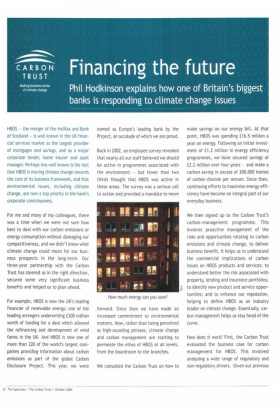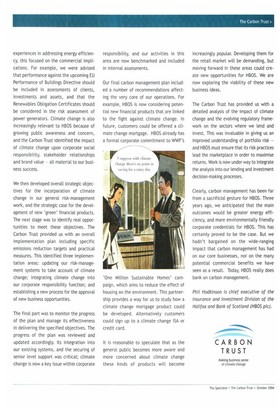Financing the future
Phil Hodkinson explains how one of Britain's biggest banks is responding to climate change issues
HBOS — the merger of the Halifax and Bank of Scotland — is well known in the UK financial services market as the largest provider of mortgages and savings, and as a major corporate lender, home insurer and asset manager. Perhaps less well known is the fact that HBOS is moving climate change towards the core of its business framework, and that environmental issues, including climate change, are now a top priority in the bank's corporate consciousness.
For me and many of my colleagues, there was a time when we were not sure how best to deal with our carbon emissions or energy consumption without damaging our competitiveness, and we didn't know what climate change could mean for our business prospects in the long-term. Our three-year partnership with the Carbon Trust has steered us in the right direction, secured some very significant business benefits and helped us to plan ahead.
For example, HBOS is now the UK's leading financier of renewable energy: one of the leading arrangers underwriting £300 million worth of funding for a deal which allowed the refinancing and development of wind farms in the UK. And HBOS is now one of more than 220 of the world's largest companies providing information about carbon emissions as part of the global Carbon Disclosure Project. This year, we were named as Europe's leading bank by the Project, an accolade of which we are proud.
Back in 2002, an employee survey revealed that nearly all our staff believed we should be active in programmes associated with the environment but fewer than two thirds thought that HBOS was active in these areas. The survey was a serious call to action and provided a mandate to move forward. Since then we have made an increased commitment to environmental matters. Now, rather than being perceived as high-sounding phrases, climate change and carbon management are starting to permeate the ethos of HBOS at all levels, from the boardroom to the branches.
We consulted the Carbon Trust on how to make savings on our energy bill. At that point, HBOS was spending £16.5 million a year on energy. Following an initial investment of £1 .2 million in energy efficiency programmes, we have secured savings of E2.2 million over four years — and make a carbon saving in excess of 200,000 tonnes of carbon dioxide per annum. Since then, continuing efforts to maximise energy efficiency have become an integral part of our everyday business.
We then signed up to the Carbon Trust's carbon-management programme. This involves proactive management of the risks and opportunities relating to carbon emissions and climate change, to deliver business benefit. It helps us to understand the commercial implications of carbon issues on HBOS products and services; to understand better the risk associated with property, lending and insurance portfolios; to identify new product and service opportunities; and to enhance our reputation, helping to define HBOS as an industry leader on climate change. Essentially, carbon management helps us stay head of the curve.
How does it work? First, the Carbon Trust evaluated the business case for carbon management for HBOS. This involved analysing a wide range of regulatory and non-regulatory drivers. Given our previous experiences in addressing energy efficiency, this focused on the commercial implications. For example, we were advised that performance against the upcoming EU Performance of Buildings Directive should be included in assessments of clients, investments and assets, and that the Renewables Obligation Certificates should be considered in the risk assessment of power generators. Climate change is also increasingly relevant to HBOS because of growing public awareness and concern, and the Carbon Trust identified the impact of climate change upon corporate social responsibility, stakeholder relationships and brand value — all material to our business success.
We then developed overall strategic objectives for the incorporation of climate change in our general risk-management work, and the strategic case for the development of new 'green' financial products. The next stage was to identify real opportunities to meet these objectives. The Carbon Trust provided us with an overall implementation plan including specific emissions reduction targets and practical measures. This identified three implementation areas: updating our risk-management systems to take account of climate change; integrating climate change into our corporate responsibility function; and establishing a new process for the approval of new business opportunities.
The final part was to monitor the progress of the plan and manage its effectiveness in delivering the specified objectives. The progress of the plan was reviewed and updated accordingly. Its integration into our existing systems, and the securing of senior level support was critical; climate change is now a key issue within corporate responsibility, and our activities in this area are now benchmarked and included in internal assessments.
Our final carbon management plan included a number of recommendations affecting the very core of our operations. For example, HBOS is now considering potential new financial products that are linked to the fight against climate change. In future, customers could be offered a climate change mortgage. HBOS already has a formal corporate commitment to WWF's 'One Million Sustainable Homes' campaign, which aims to reduce the effect of housing an the environment. This partnership provides a way for us to study how a climate change mortgage product could be developed. Alternatively customers could sign up to a climate change ISA or credit card.
It is reasonable to speculate that as the general public becomes more aware and more concerned about climate change these kinds of products will become increasingly popular. Developing them for the retail market will be demanding, but moving forward in these areas could create new opportunities for HBOS. We are now exploring the viability of these new business ideas.
The Carbon Trust has provided us with a detailed analysis of the impact of climate change and the evolving regulatory framework on the sectors where we lend and invest. This was invaluable in giving us an improved understanding of portfolio risk — and HBOS must ensure that its risk practices lead the marketplace in order to maximise returns. Work is now under way to integrate the analysis into our Lending and investment decision-making processes.
Clearly, carbon management has been far from a sacrificial gesture for HBOS. Three years ago, we anticipated that the main outcomes would be greater energy efficiency, and more environmentally friendly corporate credentials for HBOS. This has certainly proved to be the case. But we hadn't bargained on the wide-ranging impact that carbon management has had on our core businesses, nor on the many potential commercial benefits we have seen as a result. Today, HBOS really does bank on carbon management.
Phil Hodkinson is chief executive of the Insurance and Investment Division of the Halifax and Bank of Scotland (HBOS plc).



















































































































 Previous page
Previous page